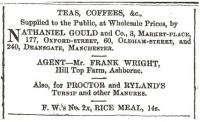
Nat Gould
His life and books
First employment
The tea business started by Nathaniel Gould 1824-1874, the father of Nat Gould, as Nathaniel Gould and His Brother continued after the death of the founder. It was still trading in Manchester fifty years later. By sheer hard work a successful enterprise had been built up, which expanded from the original selling of tea, coffee and spices to other commodities. The firm developed into what was then called an Italian Warehouse, trading in delicacies such as imported preserved fruit, and acquired a licence to sell alcoholic beverages.

Manchester Times 14 January 1865
After brother Richard Goodwin Gould had been bought out of the business in 1858 Nathaniel Gould had changed the name of the firm to Nathaniel Gould & Company, and took on a new partner Francis Wright (1). The business prospered, and took over a rival business. By 1865 it had branches at 60 Oldham Street and 260 Deansgate in Manchester.
Nat Gould left school aged 17 shortly after his father died in 1874, and began to learn the trade of a tea merchant with the remaining partner of the firm. His mother was unwell, and now had little money. She gave up the Cheetham house and took a modest flat. Nat parted company with her and went to live with the family of the remaining partner at Cheetham Hill, where he complained that he was well treated at home and yet badly in the business.
Mary Gould knew that her son now needed a strong male hand to keep him on the straight and narrow path. She had ample cause for such anxiety. Enthralled by horse racing, Nat was becoming a gambler. Although he grew to know its darker side, it was something that he was always to be ambivalent about. The headstrong young Nat and the experienced Francis Wright did not get on well, and soon began to quarrel. Still mourning the loss of his father, Nat Gould made little attempt to co-operate with the new regime. To make matters worse Francis Wright was entirely unlike Nathaniel Gould. His temper was short, his manner stern and unbending. Nat thought him irritable and apt to misjudge (2).
Nat Gould had lost the restraining hand of his father, who had known all too well that, for all their business acumen and love of their land, there was a wild restless streak in the Gould inheritance. His own brother had tired of the tea trade and gone from job to job, to the despair of his long-suffering wife whose troubles were familiar to the family. Not for nothing was Richard known in Hartington, however affectionately, as Dickey the Sinner. Young Nat had inherited that restless and wayward nature, and his energies needed channelling into some adventurous career beyond the stifling confines of Manchester or even the fresh air of Pilsbury.
He became increasingly weary of the tea trade and took time off from the business. He attended horse races and the theatre, played cricket and football, and went off training in athletics. Returning to his employer's house late in the evening, Nat sometimes found himself locked out. It was a situation that could not continue.
Nat Gould must have been a sore trial to his ailing mother, who had hoped he would follow his father in the business that he had so carefully built up. Eventually she agreed that he should abandon the tea trade. Illogically that decision also grieved Nat, who continued to think that part of his father's business ought now to have been his own. However his father's partner thought otherwise. Nat was ousted, and the two sons of Francis Wright stepped in. But even in this time of distress Nat’s basically good nature broke through. He recorded some thirty years later his sorrow that the two Wright sons were dead by then,for he had liked them and thought the feeling was reciprocated. “However, it is best to let such things rest in obscurity, and after all, everything turned out for the best” (3). For Nat at least, if not for his mother (4).
(1) Nat Gould does not reveal the name of the new partner. Indeed he wrote little about his life at that period. However he does tells us that his father had built up a large business, and that when he took in the partner it expanded greatly. The Magic of Sport pages 10 and 11. The new partner was in fact Francis Wright, a first cousin of his mother.
(2) The Magic of Sport page 15.
(3) The Magic of Sport page 17.
(4) Nat Gould: The Biography by Tom Askey (2017) pages 4-5.

